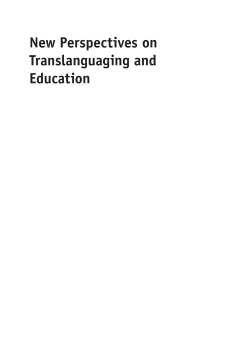
BOOK
New Perspectives on Translanguaging and Education
BethAnne Paulsrud | Jenny Rosén | Boglárka Straszer | Dr. Åsa Wedin
(2017)
Additional Information
Book Details
Abstract
This edited collection explores the immense potential of translanguaging in educational settings and highlights teachers and students negotiating language ideologies in their everyday communicative practices. It makes a significant contribution to scholarship on translanguaging and considers the need for pedagogy to reflect and embrace diversity. The chapters provide rich empirical research and document translanguaging in varied educational contexts, with studies from pre-school to adult education in different, mainly European, countries, where English is not the dominant language. Together they expand our understanding of translanguaging and how it can be applied to a variety of settings. This book will be of interest to students and researchers, especially in education, language education and applied linguistics, as well as to professionals and policymakers.
New Perspectives on Translanguaging and Education provides readers with an assortment of theoretically and methodologically sound empirical studies that together advance a comprehensive and fresh perspective on translanguaging in educational contexts.
Delis Cuéllar, University of Wisconsin-Madison, USA
The book proposes translanguaging as the practical answer to current challenges of diversity and “superdiversity” (Vertovec, 2007). More importantly, the authors use the concept to explore issues related to language rights, structures of power, and socio-linguistic hierarchies. As a scholar and teacher interested in the applied dimension of these topics, I find the collection to be a rich resource that student-teachers will find useful and thought-provoking at the same time.
Lavinia Hirsu, University of Glasgow, UK
This book is absolutely fascinating and I would highly recommend it to any person who is working with bilingual children whether in a crèche, a primary school, a secondary school or any other educational groups and/or associations welcoming bilinguals. It gives a new light on translanguaging with examples from the English-speaking world and Scandinavian countries mostly. Those can be applied anywhere.
Isabelle Barth - O'Neill
The book provides useful resources for a variety of potential readers, including researchers interested in sociolinguistics and education, policy makers in charge of education and language planning, and practitioners in language teaching, teacher education and student assessment.
Renhua Wang Nanjing Institute of Technology, China
The volume was a pleasure to read, and I firmly believe that it has done its job in working to fill the gap in documenting what translanguaging looks like in practice.
Kevin S. Carroll, University of Puerto Rico
This book moves the study of translanguaging pedagogy out of the shadows of English-speaking contexts and into predominantly Nordic lights. Paulsrud, Rosén, Straszer and Wedin elegantly crack open how language has been used to discriminate in schools, and provide us with a translanguaging space filled with tension, but also with liberating possibilities for diverse voices.
This valuable and original volume is essential reading for all engaged in the field of translanguaging in education and the wider social context. Each chapter provides significant insight into current translanguaging practices in various educational contexts and beyond, and valuably paves the way for further exploration of the evolution of translanguaging in a global age.
BethAnne Paulsrud is Postdoctoral Researcher at the Centre for Research on Bilingualism at Stockholm University, Sweden. Her research interests include multilingualism and language policy in education, English-medium instruction and linguistic ethnography.
Jenny Rosén is Assistant Professor in Language Education at Stockholm University, Sweden, and her research interests include multilingualism in educational settings, diversity and identity.
Boglárka Straszer is Assistant Professor in Swedish as a Second Language, Dalarna University, Sweden, and her research interests include multilingualism in various immigrant and minority language settings, language attitudes and identity.
Åsa Wedin is Professor in Educational Work at Dalarna University, Sweden, and her research interests include literacy and multilingualism.
Table of Contents
| Section Title | Page | Action | Price |
|---|---|---|---|
| Contents | v | ||
| Contributors | vii | ||
| 1 Translanguaging as an Everyday Practice | 1 | ||
| 2 Perspectives on Translanguaging in Education | 10 | ||
| 3 Translanguaging and Ideology: Moving Away from a Monolingual Norm | 20 | ||
| 4 Spaces for Translanguaging in Swedish Education Policy | 38 | ||
| 5 Multilingual Young People as Writers in a Global Age | 56 | ||
| 6 Pedagogies to Challenge Monolingual Orientations to Bilingual Education in the United States | 72 | ||
| 7 Translanguaging and Social Justice: The Case of Education for Immigrants who are Deaf or Hard of Hearing | 90 | ||
| 8 From Silencing to Translanguaging: Turning the Tide to Support Emergent Bilinguals in Transition from Home to Pre-school | 108 | ||
| 9 Translanguaging Space and Spaces for Translanguaging: A Case Study of a Finnish-language Pre-school in Sweden | 129 | ||
| 10 Unravelling Translanguaging: The Potential of Translanguaging as a Scaffold among Teachers and Pupils in Superdiverse Classrooms in Flemish Education | 148 | ||
| 11 Negotiating Concepts and the Role of Translanguaging | 170 | ||
| 12 Agency and Affordance in Translanguaging for Learning: Case Studies from English-medium Instruction in Swedish Schools | 189 | ||
| 13 Ideology Versus Practice: Is There a Space for Pedagogical Translanguaging in Mother Tongue Instruction? | 208 | ||
| 14 Epilogue | 226 | ||
| Index | 231 |
